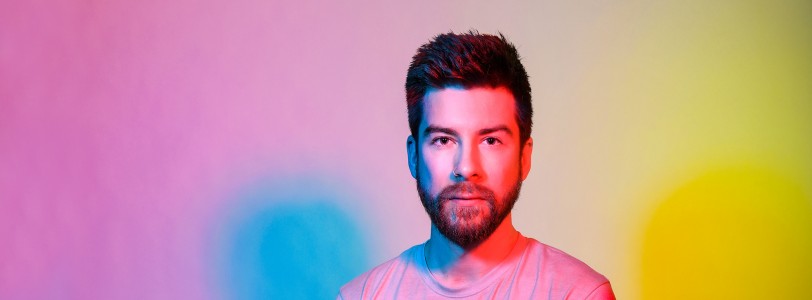Could you first introduce yourself to the reader?
My name is Richard Stott and I’ve been creating comedy for just over two years. Most of my work focuses on disability and mental health. You might have read one of my jokes as it came in as runner up in Dave’s Top 10 Funniest Jokes 2019
What does a typical day look like for you?
When I have a project on it takes a lot of organisation. Aside from the creative aspect of things there’s a heap of admin I feel I need to take care of before I can focus on writing funnies. Most of the day is spent at the kitchen table listening to background music and trying to write something I find funny, then I’ll go try it out at a gig 3 or 4 nights a week.
What do you enjoy about it?
I came from a theatre background where the focus is on teamwork, and it means relying on others. What I love about working solo is I don’t have to worry about that, I bring what I bring and I’m responsible for what happens. Some may think this brings added pressure but I find freedom in it.
And what are the bits you hate?
Admin and organisation, I’m crap at it… I’m trying to get better I promise but there’s an awful lot of planning that goes into gathering people in a room to make them laugh at a precise date and time.
You were diagnosed with Poland Syndrome as a child. Could you explain what that is?
Poland Syndrome is a birth defect which manifests itself usually in shortened bones in the fingers of the hand. It’s a wide spectrum of severity, myself being on the medium to severe. I have a smaller left hand altogether and the fingers are misshapen without joints. I was also born without a left pectoral muscle. For the most part this is a disability that doesn’t cause much of an issue but there are subtle significant issues you come up against and the mental effects of adult life with a disfigurement must be considered.
And what impact did this have on your decision to go into acting and comedy?
I first wanted to write a one man play after people had told me my story was really interesting. It surprised me that this was something people connected with but I realised that everyone has insecurities which mean they connected with my writing. However the more I wrote about it the more I realised it was much more interesting to make it a comedy. We are told to talk but not told we can laugh and suddenly I was writing stand-up comedy.
Some of your comedy is derived from your condition. Have you ever had audiences who are unsure whether to laugh along?
Certainly, it’s my job as a performer to put people at ease and create a space that people feel they have permission to laugh. It is so ingrained within us not to laugh, look, talk about anyone’s disability for fear of upsetting them… but all that does is create an elephant in the room. My work is about inviting the elephant to sit at the table and tell us about itself.
You have been outspoken on issues of body dysmorphic disorder and mental health. How have these personally affected you?
I’ve been lucky in the sense that I have never really had an issue with people making negative comments about my condition. It was when I went into the acting world that the feeling of being different took hold. There’s just less chances for performers who are a bit different. The feeling of being other was a factor in me falling into depression.
Do you think the industry is doing enough to support mental health? What more could be done?
You can’t deny it’s getting better. Comics are doing a great job of driving the discussion to the front of the queue just by writing great material about it. Collaborations like the one between the charity C.A.L.M and Dave TV are backing this up and just helping release the stigma attached to talking about it.
There have been a few things like I’m going to propose, but I think there needs to be some organised support for comics who are starting out. They’re often telling incredibly vulnerable stories in potentially difficult atmospheres, it can be a very lonely profession. I’d like to see something at the Ed Fringe ─ which is mentally very demanding ─ like a drop in room where people can drop in, sit on a beanbag and talk. I think that would be beneficial to any new comic who’s up there without their loved ones and feeling way over their heads. I believe Objectively Funny ran something like this but it would be great to see it scaled up.
And more generally, what changes have you seen in the industry? And what would you like to see?
We are starting to see more disabled performers on screen and importantly their characters are not defined by their disabilities. I think there’s been some really positive steps forward but if art is to represent life then we need to see more of it. 22% of the UK population is classed as disabled ─ that’s over 13 million! That community is still underrepresented, I think comedy is further along the way than acting as there is an appetite for those voices and stories.
Who are some of your inspirations?
Stewart Lee was the person that drew me into being a fan of comedy. Later on when I was angry with the world I’d connect with the raw nihilism of Doug Stanhope and after coming through depression I found Marc Maron. All very different performers but all of them go full throttle in terms of commitment and that’s what I took from them. I’ve never tried to emulate anyone and my performance style is different from the comics mentioned but I’ve tried to find my own voice and commit to it.
What preparation goes into a tour? Is there anything you wish you knew sooner, or sage advice you’ve been given?
It’s a big job. Tour booking, deal negotiations with theatres, press, marketing, travel logistics. Thank goodness I’m being looked after well by a small but very effective team of people. I knew it would be a big job. Someone told me to do meal prep or I’ll end up living on Ginsters pasties and have scurvy by the end of the tour… sound advice I think, but will I heed it?
If you could send a message back to 16-year-old Richard, what would you say?
Don’t stay with your first girlfriend for as long as you did Richard. I was 16 and I didn’t know what love was.
What advice would you give to someone who wants to follow in your footsteps?
Write what you think is funny and only do it if it’s making you happy. It’s easy to get caught up in the competitive nature of the comedy world but always ground yourself and remind yourself that your only job is to spread joy.
And where can people find you online?
- Twitter: @TheRStott
- Instagram: @the_rstott
- Facebook: Richard Stott Comedian
- All upcoming dates at richardstottcomedy.co.uk









0 Comments